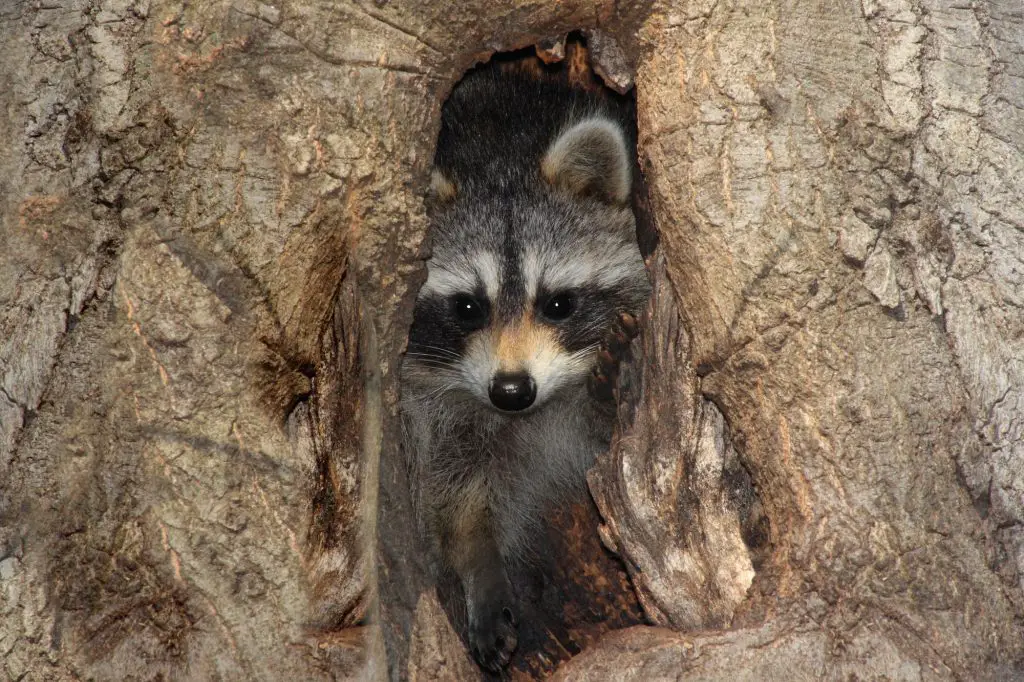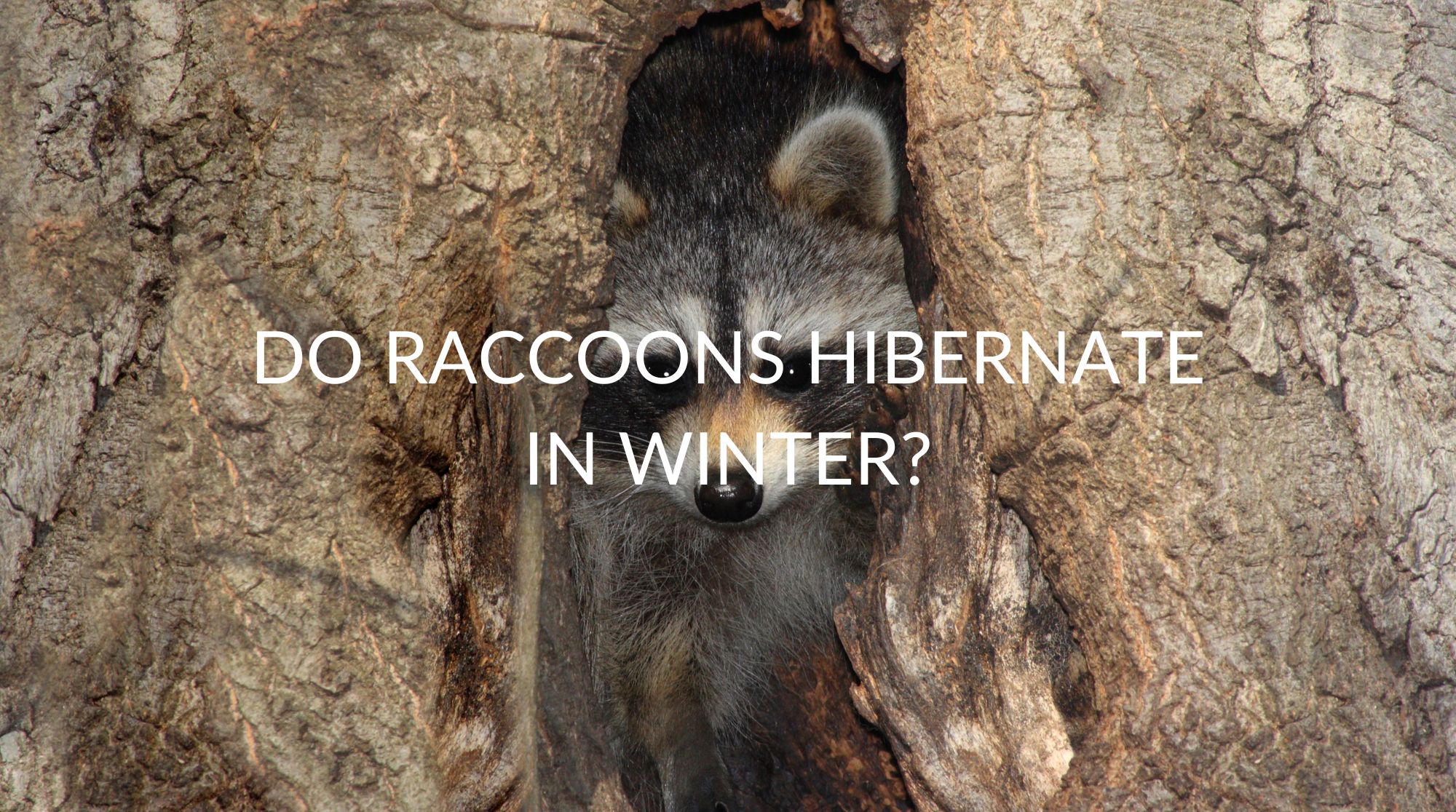Ever wonder what raccoons do in the winter? Do they hibernate, or do they carry on about their business? Because during wintertime, it doesn’t feel like there are as many raccoons around. Well, in this article, you’re going to find out whether raccoons hibernate in winter, what else they do, and how to prevent them from entering your house.
Do Raccoons Hibernate In The Winter?
No raccoons do not hibernate in the winter; however, they do become a lot less active. In fact, during the winter months, raccoons can spend several hours to days (known as torpor) at a time sleeping before waking up and looking for more food and water.
What Is Raccoon Torpor?
Torpor is a type of hibernation that raccoons go into for a few hours or days at a time. While it allows them to reduce their metabolism, after a while, they’ll need to wake up to look for more food and water.
What Do Raccoons Do In The Winter?
Now you know that raccoons don’t actually hibernate for months at a time; you may be wondering what they do in the winter months and how they’re able to survive the cold; well, here are the answers!
Find A Den
The first thing raccoons do when winter approaches is find a suitable den. They need somewhere that is going to be safe from predators while also having a food and water source nearby. And of course, it has to keep them warm as well.
One place raccoons absolutely love is trees. However, you can also find them in other areas such as small burrows, tree stumps, attics, unused garages and sheds, and even in your crawl space.
This is why it’s so important to make your home as unappealing as possible to raccoons.

Mating
Winter is the time most raccoons mate as well. They’re already spending most of their time in their dens resting, and their body also stays warmer due to the extra blood flow provided by pregnancy.
Also, raccoons a lot of raccoons tend to die during their first winter, so if raccoons mate during winter, their kits are born in spring, giving them a better chance of survival.
Grow In A Winter Coat
They’ll also shed their summer coat and build a thicker, warmer winter coat as well. Just like a lot of dogs, raccoons have a double coat too. The coat closest to their skin is full of thick fur to keep them warm, and the coat on the surface is water-resistant and helps keep their skin and inner coat dry.
They’ll Adapt Their Diet
And lastly, their diet will also be adapted to the season. While they’ll still try raiding your bins and bird feeders (even killing chickens or fish if they can), they’ll tend to eat more nuts and grains.
Their Activity Will Be Reduced
But in general, most raccoon activity will be reduced. Because they’re going into torpor, they’ll spend more time resting and less time foraging. In fact, it’s not uncommon for raccoons to lose 50% of their body weight during winters.
Where Do Raccoons Live During The Winter?
Raccoons can live in a wide variety of places during the winter months. As long as the den is safe, warm, and near food and water, they’ll happily stay there. In fact, during winter, it’s not uncommon for multiple raccoons to stay in one den to conserve body heat better. However, once summer returns, they’ll go back to being solitary animals.
How To Prevent Raccoons From Entering Your Home During The Winter?
Now that you know a raccoon’s behavior, it’s safe to say that they may end up viewing your home as a great place to make a den. Here are some of the ways you can make sure your home doesn’t look appealing to them!
Close Up Any Holes In Your Home
First of all, you’ll want to close up any holes that can give entry to your home. It’s not just the actual building you need to think about, but the crawlspace as well. And remember, raccoons are able to fit through holes the size of a softball, so even small holes can end up letting them in!
Keep Your Trash Sealed
The first thing to do is make sure your trash is well-sealed. Raccoons enjoy searching through the trash for meals. Making sure they can’t get your trash will therefore make your home far less enticing to them.
Block Off Entry To Your Home
Additionally, you should also make sure that entrances to your property are blocked off too. It’s shocking all the different ways raccoons can enter your home. So you must consider less visible entrances, such as your chimney or cat flap, in addition to addressing any more obvious points of entry.
Remove Pet Food
Make sure that you take away pet food from your pets once they have finished eating. Unfortunately, leaving pet food out all day will also draw raccoons to your house.
Shine Bright Lights At The Raccoon
If you spot raccoons in your backyard or home, when you notice them, shine a bright light on them. This is going to scare them away instantly, and if you do it enough times, they’ll begin to feel like that area is unsafe.
Make Sure Trees And Hedges Are Trimmed
You should also make sure that trees and hedges around your house are trimmed as well. This is especially true when any of these things are touching your house. A lot of the time, trees can give raccoons access to your roof or other areas of the home they can enter.
Try Scare Tactics
Things that make noise can be used to scare raccoons away as well. Wind chimes could make a raccoon jump when the wind blows, or leaving a radio on can make it seem to the raccoon that there are people in the vicinity.
Motion Activation Systems
Motion-activated sprinklers and lights can also scare raccoons, so the next time they enter your property, they might be enough to scare them away!
Improve Your Fence
If you don’t have a fence, then you should first of all install one to make it harder for raccoons to enter your premises. However, if you already have a fence, make sure that it also goes deep underground as well.
Not only are raccoons good at climbing, but they’re also good at digging, so you need to make sure you’re cutting off both ways in.
Predator Urine
And lastly, predator urine can be an effective way to get rid of raccoons as well. Bobcats, cougars, and even domestic dogs are all predators to raccoons, so purchasing some predator urine is a great way to deter them!
Keep Chickens Safe
You also need to make sure if you’re looking after chickens that, you keep them safe as well. Make sure they’re being housed in a coop that can be locked at night. On top of this, you also want to make sure that the fencing goes about a foot and a half underground because raccoons are known to dig to get to chickens.
Protect Ponds
You should also make sure that the fish in your ponds are being protected as well. To do this, make sure that you’ve built hiding places in the pond fish can swim to stay safe. Likewise, you can also put netting over the pond at night to prevent raccoons from getting to them.
Recap
Now you know that raccoons don’t hibernate, but they go into a torpor which is similar, only it lasts a far shorter amount of time. During torpor, their metabolism will slow down, allowing them to conserve energy.
If you liked this article, make sure you check out the rest of the website! Otherwise, have a great day!


